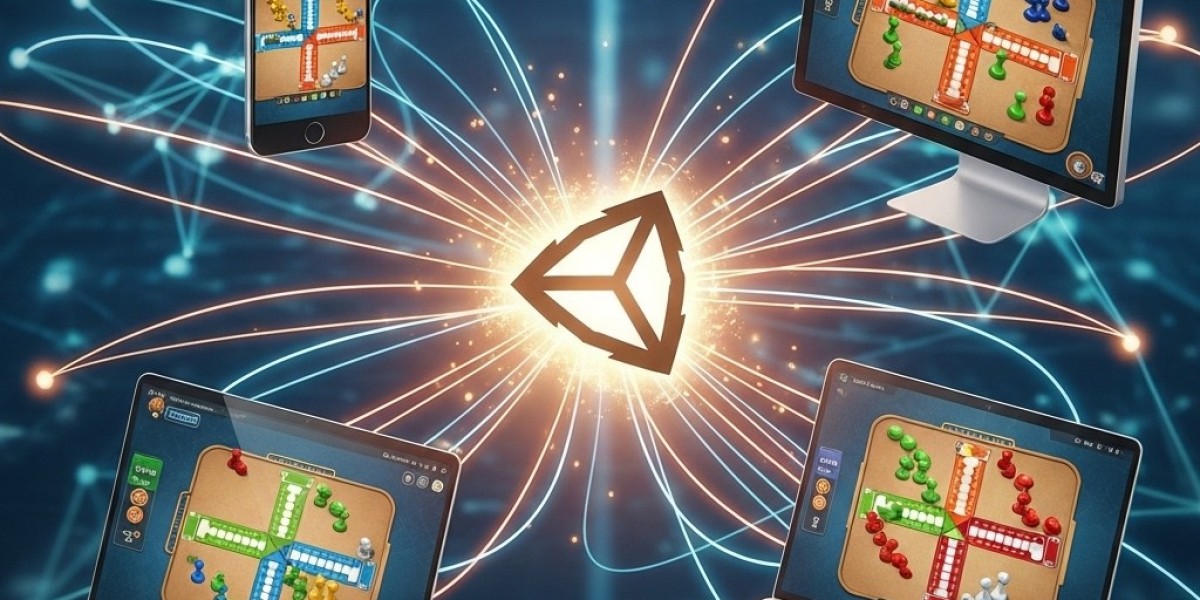The world of digital gaming has undergone a massive transformation in the past decade, and one game that has stood the test of time, while still managing to reinvent itself for new audiences, is Ludo. From its humble beginnings as a traditional board game played in Indian households, Ludo has now become a multiplayer digital sensation. In fact, the rise of mobile gaming platforms has amplified its reach, making it one of the most downloaded and played games across the globe.
But behind every smooth roll of the dice and engaging match lies a powerful technology engine that drives it all: Unity. For developers looking to create multiplayer Ludo games with engaging visuals, seamless animations, optimised performance, and multi-device support, Unity has emerged as the go-to choice.
This blog will explore in detail why Unity reigns supreme in multiplayer Ludo game development, diving into its unique features, cross-platform advantages, and the way it enables developers to bring Ludo into the modern digital landscape.
The Evolution of Ludo into the Digital Realm
Before diving into Unity's dominance, let's first understand why Ludo has become such a cornerstone in the mobile gaming industry.
From Physical Board to Screens: The transition from a physical dice-and-board setup to an online multiplayer format has allowed people to play with friends and strangers without geographical limitations.
Pandemic Push: During COVID-19 lockdowns, Ludo emerged as one of the most played games worldwide. The nostalgia combined with the thrill of online multiplayer made it the perfect stress reliever.
Monetisation & Customisation: Digital Ludo apps introduced monetisation models like in-app purchases, ad integrations, and premium versions, making it a lucrative venture for developers.
Global Audience: A once region-specific pastime has now become an international game. The online multiplayer mode connects players from India to Europe to Africa.
But none of this would have been possible without powerful game development platforms, and that's where Unity shines.
Why Unity? A Quick Introduction
Unity is one of the world's most widely used game development engines, powering over 50% of mobile games globally. Its reputation comes from its ability to:
Support 2D and 3D game development.
Deliver high-performance graphics and animations.
Provide cross-platform compatibility (Android, iOS, Windows, macOS, and more).
Offer scalable networking solutions for multiplayer gaming.
Equip developers with a massive ecosystem of tools, assets, and plugins.
When it comes to multiplayer Ludo game development, Unity's set of features aligns perfectly with the requirements: lightweight, smooth, cross-platform, and optimised for real-time interactions.
Smooth Animations: Breathing Life into Digital Ludo
Ludo is a simple board game, but animations play a crucial role in elevating the user experience.
Dice Roll Animations
The dice roll is the heart of the game. A static dice roll feels lifeless, but with Unity's realistic physics and animation tools, developers can create:
Smooth dice roll animations with natural physics.
Dynamic dice bounce, roll, and stop sequences that enhance engagement.
Customisable skins and themes for dice to attract diverse players.
Token Movements
Moving a token from one tile to another is another area where Unity shines.
Bezier curves and spline animations allow smooth transitions.
Unity's physics engine ensures tokens never "jump" awkwardly.
Particle effects (like sparkles, trails, or confetti bursts) can be added when a player wins.
Interactive UI/UX
Beyond the board, Unity allows developers to create fluid user interfaces with transitions, scoreboards, and chat windows, ensuring the multiplayer experience feels alive.
Bottom Line: Smooth animations in Unity aren't just visual candy—they increase engagement and make players want to stay longer in the game.
Optimised Performance: Unity's Winning Edge
Multiplayer games demand more than just pretty animations—they require optimised performance to ensure real-time play without lag or glitches.
Lightweight Builds
Unity allows developers to create lightweight game builds that can run on low-end smartphones as well as high-end gaming devices. This inclusivity is critical in markets like India, where players use a wide range of devices.
Efficient Memory Usage
With Unity's built-in tools for asset compression, texture management, and memory optimisation, developers can keep load times short and ensure smooth gameplay.
Real-Time SynchronisationSynchronisation
Multiplayer Ludo games rely heavily on synchronisation across devices. Unity's networking libraries (like Unity Netcode for GameObjects) ensure that dice rolls, token movements, and turn sequences are updated in real-time with minimal latency.
Lag-Free Experience
Unity's support for frame-rate optimization and GPU-friendly rendering ensures a lag-free experience. This is crucial when four players are competing simultaneously.
Bottom Line: A laggy multiplayer game is a dead game. Unity ensures smooth performance even with thousands of concurrent players.
Read More blog :-
Cross-Platform Capabilities: One Code, Many Screens
One of Unity's most celebrated features is its cross-platform support. For a game like Ludo, which has a diverse global audience, this is a game-changer.
Single Codebase Deployment
Developers can write the game logic once and deploy it across multiple platforms:
Android
iOS
Windows
macOS
WebGL (browser-based Ludo games)
This drastically reduces development time and cost.
Seamless Experience Across Devices
Unity ensures that the game looks and feels the same whether you're playing on a smartphone, tablet, or PC. This consistency builds brand loyalty.
Support for Emerging Platforms
With Unity's continuous updates, developers can easily adapt their Ludo games for new platforms like VR/AR or smart TVs, giving them a competitive edge.
Bottom Line: Unity breaks the barrier of platform limitations, making Ludo accessible to everyone, everywhere.
Multiplayer Networking Made Simple
Multiplayer functionality is the backbone of modern Ludo games. Unity makes it easier than ever to implement real-time multiplayer features.
Unity Netcode: Provides libraries and frameworks for syncing game states across multiple players.
Photon Unity Networking (PUN): A popular third-party solution for Unity that simplifies multiplayer matchmaking and real-time communication.
Matchmaking & Lobby Creation: Unity supports smooth creation of game rooms, random matchmaking, and private friend lobbies.
Scalability: Whether it's 10 or 10,000 concurrent players, Unity-backed multiplayer servers can scale easily.
Example: A group of friends in different cities can connect instantly, roll dice, move tokens, and chat in real time—all thanks to Unity's networking prowess.
Rich Ecosystem of Assets & Plugins
Unity's Asset Store is a treasure chest for Ludo developers.
Ready-to-use board designs, dice models, and token assets.
UI kits for seamless multiplayer integration.
Plugins for ads, in-app purchases, and analytics.
AI tools for developing intelligent bots, allowing players to practice offline.
This ecosystem reduces development time while still allowing customisation for unique branding.
Scalability and Monetisation with Unity
Unity not only helps developers build Ludo games but also ensures they can scale and monetise effectively.
Ad Integrations
Unity Ads allows seamless integration of rewarded ads, interstitials, and banners, ensuring monetisation doesn't ruin the gameplay.
In-App Purchases
Unity's IAP tools allow developers to add:
Premium dice skins
Token customisations
Paid ad-free versions
Analytics
Unity Analytics helps track player behaviour, churn rate, and revenue, giving developers insights to optimise monetisation strategies.
Community Support & Continuous Updates
Unity has one of the largest developer communities in the world. For any bug, feature request, or optimization trick, there are endless resources—forums, documentation, tutorials, and expert advice.
Moreover, Unity continuously rolls out updates to support the latest devices, OS versions, and market trends. This ensures your multiplayer Ludo game is always future-proof.
Case Studies: Unity-Powered Ludo Games
Several popular Ludo games dominating the app stores today are powered by Unity. These games have achieved:
Millions of downloads.
Stable multiplayer performance.
High monetisation through ads and IAPs.
This is living proof of why Unity is the industry standard for such games.
The Future of Multiplayer Ludo with Unity
With emerging technologies like blockchain gaming, AR/VR, and AI-driven personalisation, Unity continues to be the platform that can evolve with these changes. Future Ludo games might integrate:
AR-based boards where players roll dice on a real-world table through AR glasses.
Blockchain-backed token ownership, where digital assets (like custom dice) can be traded.
AI-based matchmaking for smoother gameplay.
Unity is already prepared for this future, ensuring that Ludo's reign in the digital space continues.
Conclusion
Ludo's journey from a traditional family pastime to a global multiplayer sensation wouldn't have been possible without powerful engines like Unity. From smooth animations to optimised performance, from cross-platform support to multiplayer networking, Unity offers everything developers need to build engaging, scalable, and profitable Ludo games.
Simply put, Unity reigns supreme in multiplayer Ludo game development because it combines technical robustness with creative freedom. Whether you're a startup, an indie developer, or a large gaming studio, Unity ensures your Ludo game isn't just another app—it's an experience players return to again and again.








